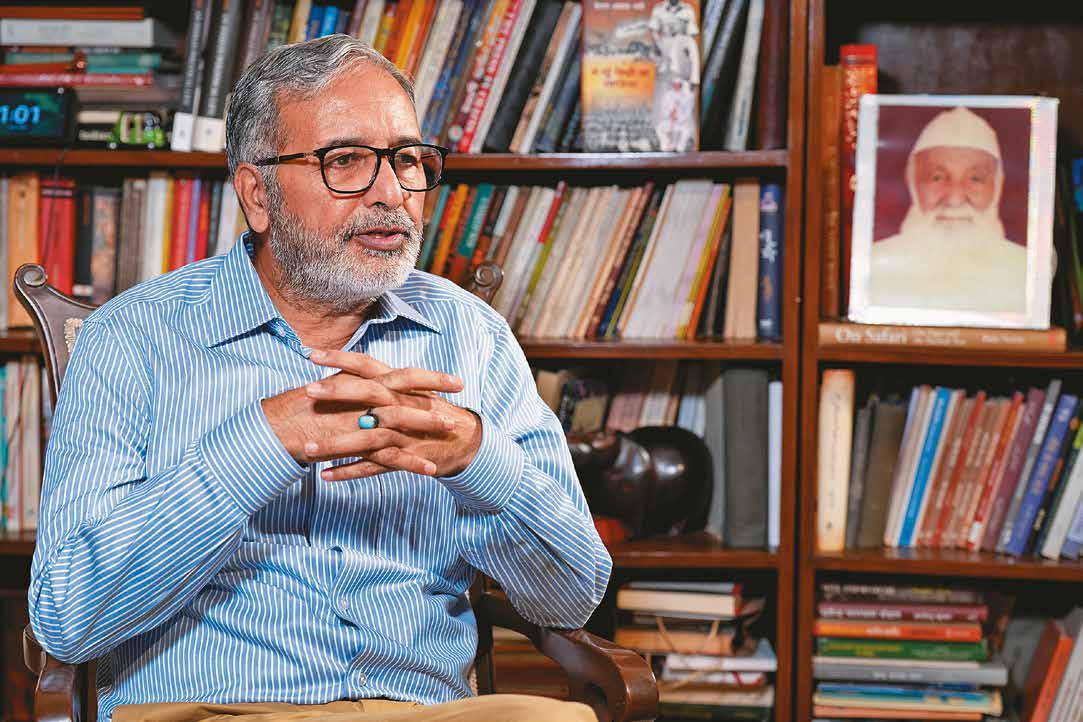The Darkest Hour

In the backdrop of the recent controversy regarding the release of the Bollywood film Emergency, featuring Bharatiya Janata Party (BJP) MP Kangana Ranaut in the lead role, and the BJP's push for 'Samvidhan Hatya Diwas' to commemorate 50 years of the Emergency, Ali spoke to Outlook about the "dark days" and the political legacy of the Emergency. He has keenly followed India's freedom struggle and is now documenting the history of the Socialist movement in the country.
MY father was very fond of going to jail. Before Independence, he was arrested by the British government in India, court martialled, and sentenced to death for marching with Subhash Chandra Bose's Azad Hind Fauj (INA). Saved by Independence, he spent the next decades of his newfound freedom in and out of prison. As part of the Socialist movement, he was jailed about 50 times between 1948 and 1974 for demonstrating different forms of civil disobedience. His toughest incarceration, nevertheless, was the last one during the Emergency, imposed by Indira Gandhi on June 25, 1975. I was about 12 years old at the time. Yet, memories of those days come back to me in a whirl of pamphlets, slogans, protests and resistance, like it was just yesterday.
We were at my nana's (maternal grandfather) house in a remote village in Aligarh when we heard about the Emergency and the mass arrest of political workers and Opposition leaders. It was the peak of the JP (Jayaprakash Narayan) movement and my father, a popular Socialist leader in Uttar Pradesh (UP) at the time, had been participating in demonstrations being held across the country since the June 12, 1975 Allahabad High Court judgement, of which my father had been a witness. We knew he was likely to be arrested, and he was. But his arrest was not made public. For nearly two months, we searched high and low for him but without a clue. We did not know which jail he was in, under what charges he was arrested, or whether he was even alive.
この記事は Outlook の October 01, 2024 版に掲載されています。
7 日間の Magzter GOLD 無料トライアルを開始して、何千もの厳選されたプレミアム ストーリー、9,500 以上の雑誌や新聞にアクセスしてください。
すでに購読者です ? サインイン
この記事は Outlook の October 01, 2024 版に掲載されています。
7 日間の Magzter GOLD 無料トライアルを開始して、何千もの厳選されたプレミアム ストーリー、9,500 以上の雑誌や新聞にアクセスしてください。
すでに購読者です? サインイン

Education for the Greater Good
UEM Jaipur in its Mission to Provide Global Exposure with Innovative Teaching Techniques

Delivering Care Everywhere
Innovative healthcare, accessible to all communities across India

First Model Hospital for Global destination with New Benchmarks
Yashoda Medicity is a holistic ecosystem, a convergence of medical brilliance, technology, education, and patient-centred values, poised to redefine healthcare delivery in India and beyond

Green Growth: A New Normal
Indian real estate embraces sustainable design, net-zero goals and eco-friendly innovation to shape resilient, future-ready urban landscapes.

Precision Meets Expertise
Pioneering ROBOTIC Knee & Hip Replacements, Dr (Prof) Anil Arora is redefining mobility with advanced technology and compassionate care

The 5 Best Monsoon Treks in Maharashtra
This curated list of the best monsoon treks in Maharashtra highlights both natural beauty and historical significance of the state while also being ideal for lovers of adventure

Batwoman
Women have gatecrashed a stag party, smashing their way through the sexist walls of bias and invisibility to live their cricket dreams, no more in the margins but in the spotlight

Elite Bench
Why diversity and inclusion in cricket remain elusive
'Write What Should Not be Forgotten'
Chilean-American author Isabel Allende’s latest book My Name is Emilia Del Valle, set during the 1891 Chilean civil war, is the story of a young woman’s search for her identity.

It is Lonely at the Top
Chief Minister Omar Abdullah faces rebellion from within the National Conference. Lieutenant Governor Manoj Sinha is breathing down his neck. His political rival, Mehbooba Mufti, is sharpening her attack
